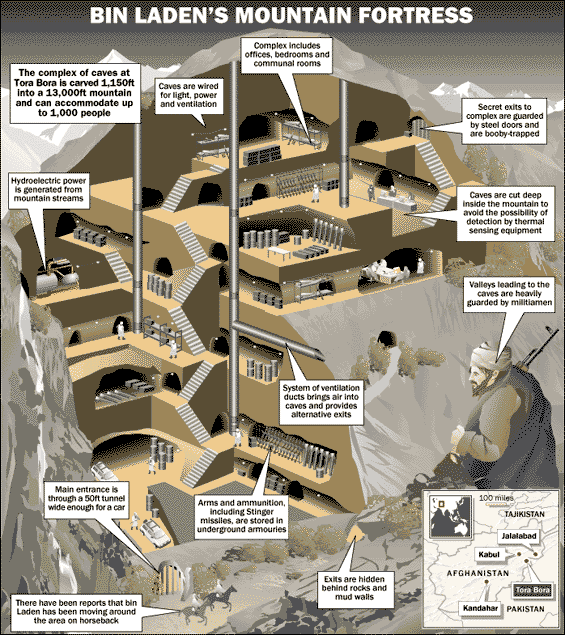The many ways the #Neocons were wrong about #Iraq... ►http://www.sanders.senate.gov/flashback-republicans-iraq-cheney-wolfowitz-kristol #Irak
Senator Bernie Sanders of Vermont
http://www.sanders.senate.gov
-
-
Tu te souviens, quand Rumsfeld et les grands médias internationaux ont inventé le bunker secret d’Al Qaeda creusé dans la montagne ?
▻https://www.youtube.com/watch?v=sEJe5l_ELSA
Rumsfeld: Oh, you bet. This is serious business. And there’s not one of those. There are many of those. And they have been used very effectively. And I might add, Afghanistan is not the only country that has gone underground. Any number of countries have gone underground.
▻http://fr.wikipedia.org/wiki/Bataille_de_Tora_Bora
Une rumeur largement reprise dans la presse à l’époque fut qu’à Tora Bora se trouvait un gigantesque complexe souterrain. Tout est apparemment parti d’une description faite dans le New York Times des grottes de Zhawar Kili dans la province de Paktiyâ d’après le récit d’un vétéran russe, Viktor Kutsenko, un sapeur chargé de les détruire en 1986. Selon Kutsenko, il y avait 41 grottes, fermées par des portes en acier, où l’électricité était installée, comprenant diverses installations très équipées dont un hôpital avec une machine à ultra-sons, et l’une d’elles contenait même un char T-342. Divers articles de journaux ont ensuite repris la description de cette « forteresse souterraine », en la situant à Tora Bora au lieu de Zhawar Kili, en l’amplifiant en parlant d’une véritable fourmilière creusée à 300 mètres sous la montagne, pouvant accueillir des centaines voire des milliers d’hommes, équipée de systèmes de ventilation, etc., le tout parfois illustré de vues d’artistes spectaculaires3. Finalement, aucun complexe souterrain sophistiqué n’a été trouvé à Tora Bora, mais de nombreuses grottes qui servaient d’abris à personnel, d’hôpital et d’entrepôts à munitions4.
-
-
-
Dans le genre nostalgie, il y a aussi, « tu te souviens quand l’armée irakienne était la troisième du monde » ?
-
Flashback: What Neocons Told Us about Iraq - Senator Bernie Sanders of Vermont
►http://www.sanders.senate.gov/flashback-republicans-iraq-cheney-wolfowitz-kristolPaul Wolfowitz:
– “It’s hard to conceive that it would take more forces to provide stability in post-Saddam Iraq than it would take to conduct the war itself and to secure the surrender of Saddam’s security forces and his army. Hard to imagine.” Feb. 27, 2003 (Source)
– "Peacekeeping requirements in Iraq might be much lower than historical experience in the Balkans suggests. There’s been none of the record in Iraq of ethnic militias fighting one another that produced so much bloodshed and permanent scars in Bosnia along with the requirement for large policing forces to separate those militias.” Feb. 27, 2003 (Source)
– “These are Arabs, 23 million of the most educated people in the Arab world, who are going to welcome us as liberators.” Feb. 27, 2003 (Source)
-
-
What the U.S. Can Learn About Health Care from Other Countries
▻http://www.sanders.senate.gov/newsroom/recent-business/us-can-learn-other-countries-health-careOther major countries offer better health care at less cost than the United States, according to witnesses who testified on Tuesday at a Senate hearing chaired by Sen. Bernie Sanders. “What this hearing is really about is two fundamental issues. First, the U.S., the wealthiest country on the planet, is the only major industrialized country in the world that does not guarantee health care as a right to its citizens. Should we consider joining the rest of the world? I’d argue we should,” Sanders said. “Second, the U.S. spends twice as much as other countries that have much better health outcomes. What can we learn from these countries?” asked Sanders, chairman of the Senate Subcommittee on Primary Health and Aging.
Citing World Health Organization data, Sanders said the U.S. spends as much as three times more on health care than other industrialized countries. Health care outlays in the U.S. account for about 18 percent of our Gross Domestic Product, significantly more than in France, Germany, Denmark, Canada, Great Britain, Australia, Norway, Taiwan and Israel.
In Denmark, “all citizens have access to care; no one may be denied services on the basis of income, age, health or employment status,” according to Jakob Kjellberg, an economist from Copenhagen. Victor Rodwin, an expert on the French health care system, said “the French have easy access to primary health care, as well as specialty services, at half the per capita costs of what we spend in the U.S.”
Other witnesses said the money Americans sink into their expensive health care system does not buy better care. “Canada achieved health outcomes that are at least equal to those in the U.S. at two-thirds the cost,” according to one witness at the hearing, Dr. Danielle Martin of Women’s College Hospital in Toronto.
The United States ranks 26th in life expectancy compared to other countries ranked by the Paris-based Organization for Economic Cooperation and Development. People who live in Italy, Spain, France, Australia, Israel, Norway and other countries live 2 to 3 years longer than Americans.
The Affordable Care Act has improved access to insurance, but millions of Americans still lack insurance or have plans with such high deductibles and copayments that they cannot afford the care they need. As a result, some 45,000 uninsured Americans die each year because they didn’t go to a doctor in time.
A major factor driving up health care costs in the U.S. is the high cost of prescription drugs. Hospital stays also cost more. While hospitals in Germany and France charge $3,000 for an appendectomy, for example, the average price for the same procedure in American hospitals is $13,000. Some U.S. hospitals charge $28,000.
“It is time for the U.S. to join the rest of the industrialized world and guarantee access to health care as a right of all people, not just a privilege for those who can afford it,” Sanders said.









